Introduction
An encumbrance certificate (EC) is a legal document showing the property’s ownership status and any monetary or legal liabilities attached. To obtain an EC online in India, you can visit the official website of the local land revenue department and follow the instructions for submitting an online application along with the required documents. Once the application is processed and approved, you can download the encumbrance certificate from the website.
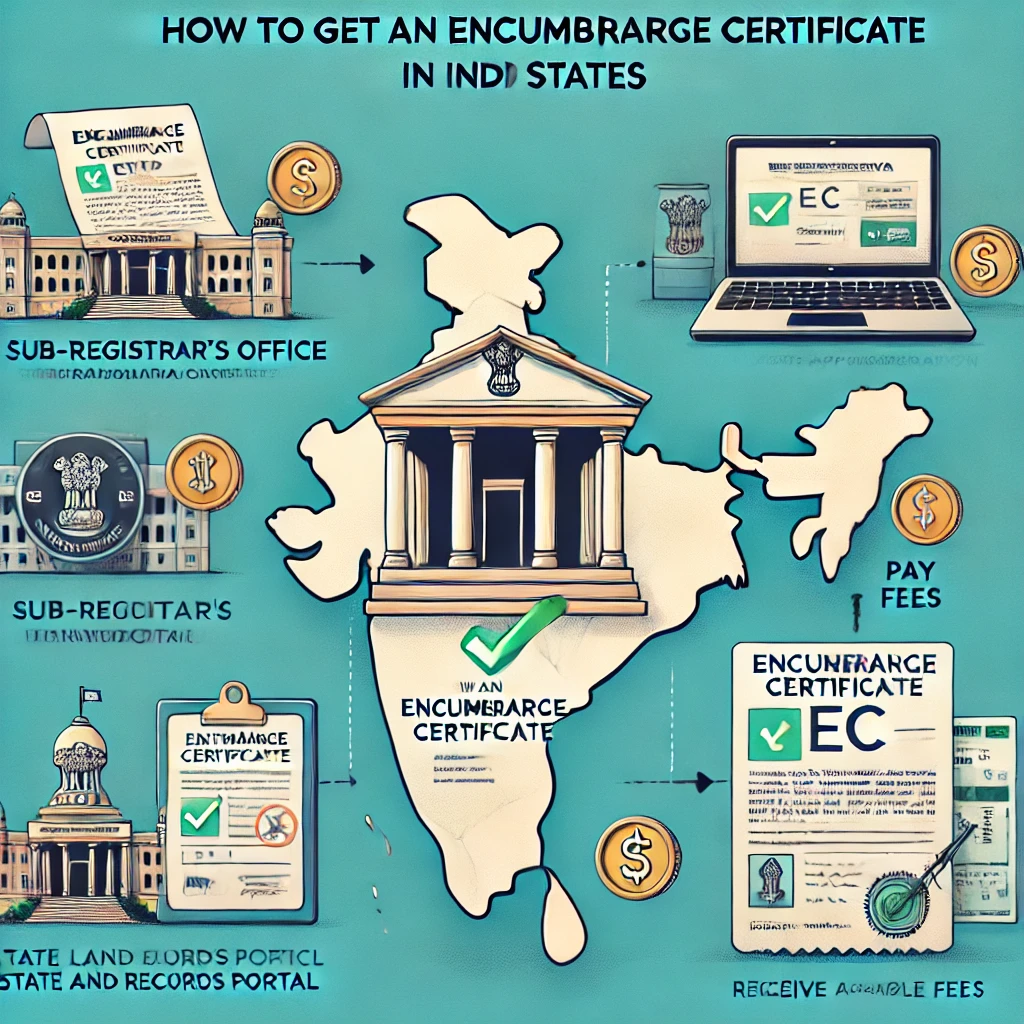
Table of Contents
- What is an Encumbrance Certificate?
- Importance of Encumbrance Certificate in Property Transactions
- Who Can Apply for an Encumbrance Certificate?
- Necessary Documents for Application
- How to Apply for an Encumbrance Certificate (EC)?
- How to Get Encumbrance Certificate in Indian States?
- How to Check EC Application Status Online
- Frequently Asked Questions
It is an important document to verify the property’s title and ensure there are no pending dues or legal issues associated with it. The encumbrance certificate can be used as proof of ownership when buying or selling a property and is often required by banks for loan approvals. Regularly checking and updating this document to maintain the property’s clear title status.
What is an Encumbrance Certificate?
An Encumbrance Certificate (EC) is a legal document that verifies a property’s ownership status and confirms if it has any legal or financial liabilities. It’s also known as a property certificate.
An EC is important for several reasons, including:
- Property transactions: It’s a required document for registering ownership, transferring property, or executing a sale.
- Loan applications: Banks often require an EC before sanctioning a loan against a property.
- Fraud prevention: It provides a transparent record of property transactions, which helps prevent fraudulent transactions.
- Ownership history: It provides a record of ownership over time, which can help establish a history of property transactions.
Importance of Encumbrance Certificate in Property Transactions
An Encumbrance Certificate (EC) is a crucial legal document that’s important in property transactions because it ensures that a property is free of legal claims, loans, or mortgages. An EC assures buyers that the property is free of any pending financial obligations or legal disputes.
Lenders use an EC to evaluate the property’s value and determine the loan amount and interest rates. An EC is required for mutation, which is the process of updating ownership records with local authorities. If there are unpaid property taxes, an EC is used to update the tax records. An EC may be required as proof of collateral if you pledge your property.
Who Can Apply for an Encumbrance Certificate?
An Encumbrance Certificate is available to anyone with a legitimate interest in a property in India. Common applicants include:
- Property Owners: The most frequent applicants are individuals or entities who own the property. Owners apply for an EC to validate the property’s legal standing before selling or transferring ownership.
- Potential Buyers: Prospective property buyers often request an EC to confirm that the property they plan to purchase is free from debts, mortgages, or other legal disputes.
- Financial Institutions: Banks and lending institutions may apply for an EC when property is used as collateral for loans. This ensures that the property has no prior claims or liabilities that might affect repayment.
- Legal Representatives: Attorneys, property agents, or other legal representatives can apply for an EC on behalf of their clients, provided they hold the necessary authorization documents, such as a Power of Attorney.
- Heirs or Successors: In cases of inheritance or succession, the heirs may apply for an EC to ensure that the property is free of encumbrances before finalizing their legal claim.
- Corporate Entities: Corporations or businesses engaging in property transactions, whether buying or leasing, may also require an EC to confirm a clean title for the property.
Necessary Documents for Application
Applying for an Encumbrance Certificate involves submitting certain mandatory documents. These vary slightly depending on the state’s registration office but generally include the following:
- Application Form: A filled-out EC application form is available online or at the local sub-registrar’s office.
- Proof of Identity: Individuals need a valid government-issued ID such as an Aadhaar card, voter ID, or passport. In the case of companies, registration documents or authorization letters are needed.
- Property Details: Complete address of the property. Survey number, plot number, or property tax receipts are used to identify the property precisely.
- Title Deed: A copy of the registered property title deed is essential to establish ownership or interest in the property.
- Power of Attorney (if applicable): If the application is being submitted by someone other than the owner, a notarized Power of Attorney is required.
- Previous Sale Deeds: In some cases, copies of previous sale deeds may be requested to cross-verify property details.
- Affidavit (if required): An affidavit stating the purpose of the EC application, especially for special cases such as disputes or succession claims.
- Application Fee Receipt: Proof of payment for the application processing fee varies across jurisdictions.
How to Apply for an Encumbrance Certificate (EC)?
An encumbrance certificate can be obtained from the local sub-registrar’s office by applying for it along with the necessary documents, such as property details and proof of ownership. The certificate is usually issued within a few days and can be used as proof of clear title when buying or selling a property. It is important to ensure that all the required documents are in order and that any outstanding dues or liabilities on the property are cleared before applying for the certificate. Additionally, it is advisable to follow up with the sub-registrar’s office if there are any delays in receiving the certificate.
Offline Method
- Visit the local sub-registrar’s office with the necessary documents.
- Fill out the EC application form and submit it along with the supporting paperwork.
- Pay the applicable fee at the office.
- Obtain the acknowledgment receipt for tracking the application status.
Online Method
Many states now offer online portals for EC applications:
- Register on the official portal of the state’s revenue department.
- Upload the required documents.
- Fill in the application form with accurate details.
- Pay the application fee online.
- Download the acknowledgment for future reference.
How to Get Encumbrance Certificate in Indian States?
The Encumbrance Certificate is one of the most critical documents you need while selling or buying a property. So, you can visit an online website to get EC. An EC is a vital document for property transactions that ensures the property is free from legal liabilities. It provides a complete history of the property’s ownership and any encumbrances that may have existed previously. To get an EC online in India, you can follow these steps:
- Go to the official website of the state’s land registration portal
- Click on the Apply EC option
- Log in using your username and password
- Enter the captcha code and click Login
- If you are not registered, click Register and fill in the required details
- Enter the search period for the EC and click Calculate Fee
- Pay the application fee
- Click View Acknowledgement to print the acknowledgement.
Encumbrance Certificate Process in Telangana
To obtain an encumbrance certificate in Telangana, you can apply online through the registration and stamps department website or visit the nearest sub-registrar office with the necessary documents. The EC is a crucial document that shows all transactions related to a particular property, including mortgages, liens, and legal claims. To get an EC in Telangana, you can apply online or offline:
- Go to the Meeseva portal
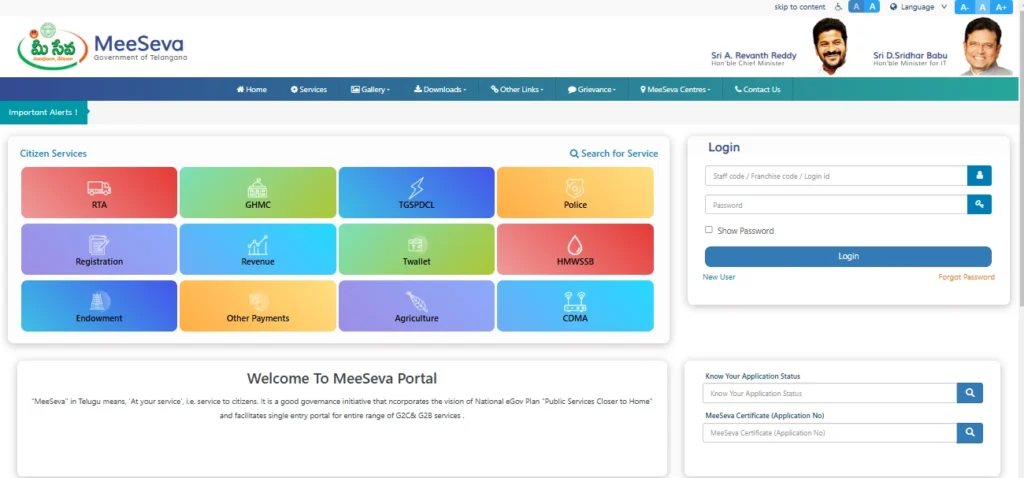
- Select Government Forms
- Select Meeseva Services (Registration button)
- Track the application status using the reference number
- Select Encumbrance Certificate under Registration
- Download and fill out the application form
- Attach the required documents
- Pay the application fee
- Submit the application electronically
Offline:
- Visit the local sub-registrar office
- Submit the required form and fees
The EC is valid for a specific date and may change. It’s an important document for property transactions, such as buying or selling a property, or taking out a loan against it.
The cost of an EC in Telangana is: Legal fees
- Under 30 years: Rs. 200
- 30 or older: Rs. 500
Encumbrance Certificate Process in Andhra Pradesh
An encumbrance certificate in Andhra Pradesh can be obtained by visiting the local sub-registrar office and submitting an application along with the necessary documents. The certificate is typically issued within a few days and provides information on any legal liabilities or claims on a property. It is an important document to verify the ownership status of a property before purchasing it. You can also get an EC before 1983 by contacting the appropriate SRO office. The EC can also be obtained online through the official website of the Registration and Stamps Department of Andhra Pradesh.
To get an encumbrance certificate (EC) in Andhra Pradesh, you can:
- Go to the official website of the Department of Registration and Stamps, Andhra Pradesh
- Navigate to the Online Services or Encumbrance Certificate section.
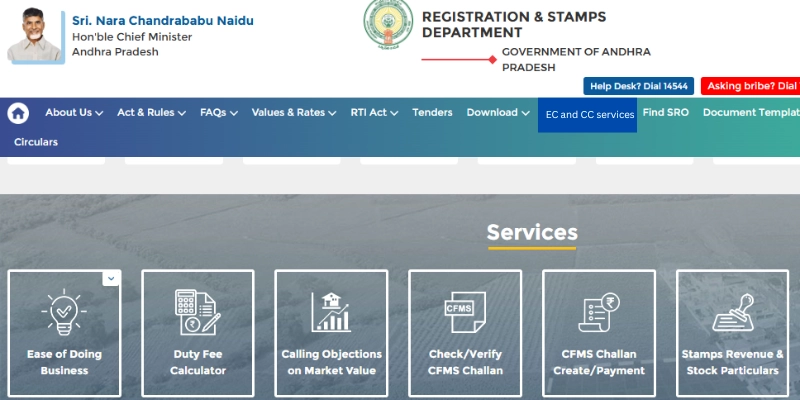
- Log in or create an account if required
- Fill in the property details and specify the search duration.
- After, you need to download the EC form.
Encumbrance Certificate Process in Haryana
The encumbrance certificate process in Haryana involves submitting an application form along with the necessary documents to the concerned authority. Once the application is processed, the certificate is issued. That provides details of any existing liabilities or legal issues on the property. It is important to note that the EC is a crucial document for property transactions in Haryana. It helps verify the ownership and legal status of the property.
Online process in Haryana
- Go to the Haryana Land Records Portal.
- Next, click the property registration button. You will see the list and select an encumbrance certificate to apply for a new one.
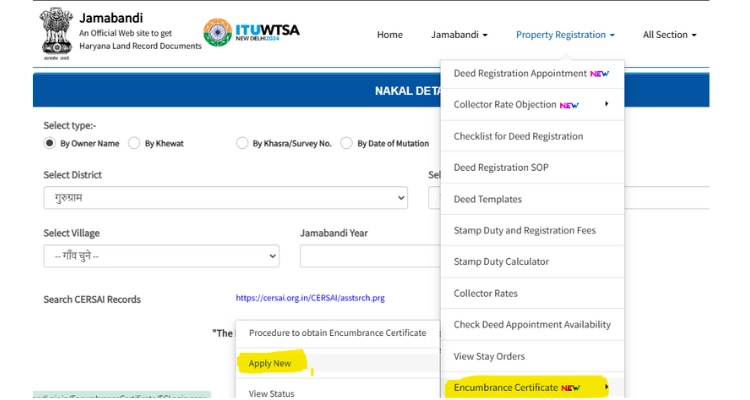
- After, register using your email and mobile number.
- Fill out the application form with the property details.
- Upload the required documents, including proof of ID and property sale deed.
- Pay the fee using net banking, UPI, or debit/credit card.
- Apply and save the reference number.
Offline Process in Haryana
- Visit the nearest sub-registrar’s office.
- Fill out the application form, Form 22, with the required details.
- Submit the required documents, including address proof, title details, property details, and the fee.
- Pay the prescribed fee
- Collect the acknowledgement receipt.
After the application is submitted, the sub-registrar’s office will inspect the property and check the index for previous deeds. The EC will be issued in 6 to 30 working days. An EC contains information on all registered transactions for a property over a specified period, usually up to 30 years.
Encumbrance Certificate Process in Kerala
The Encumbrance Certificate process in Kerala involves submitting an application form along with the necessary documents to the local sub-registrar office. Once the Application is processed, the certificate will be issued, providing details of any existing encumbrances on the property. This certificate is essential for property transactions to ensure there are no legal liabilities or claims on the property. To get an EC in Kerala, you can apply online or offline.
Online Process in Kerala
- Go to the Kerala Stamps and Registration Department’s online portal at pearl.registration.kerala.gov.in
- Click Certificates, then Application for Encumbrance Certificate.
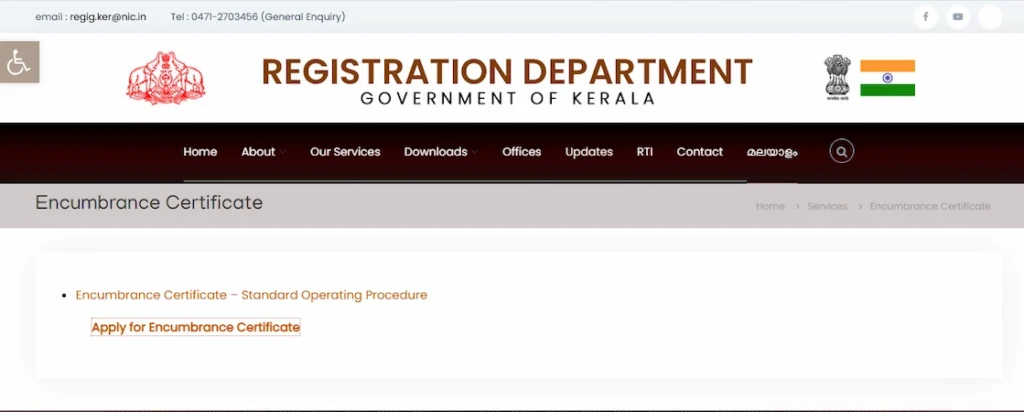
- Fill out the application form with your property details, search period, number of owners, and other required information.
- Enter the purpose of the certificate and click Submit Application.
Offline Process in Haryana
- Visit the nearest Sub-registrar’s office.
- Collect Form 22 of EC and fill it out.
- Submit the form along with property details, title details, and other required documents.
- Pay the applicable fees
- An officer will inspect the details and generate an acknowledgement slip.
How to Check EC Application Status Online
Most state portals offer a status-check feature. Here’s how you can track your application:
- Visit the official portal and log in using your credentials.
- Navigate to the “Track Application Status” section.
- Enter your application number and click “Submit.”
- View the current status of your EC application, including whether it is under review, approved, or requires additional documentation.
Conclusion
Understanding who can apply for an Encumbrance Certificate and ensuring the submission of proper documents are critical steps in the property verification process. Whether you’re a buyer, owner, or legal representative, this certificate offers peace of mind by certifying the absence of financial or legal encumbrances on a property. By following the outlined steps and requirements, you can streamline the application process and avoid potential pitfalls in property dealings.
| Also read How to Get an E-Stamping Certificate Online in India? In the era of digitalization, e-stamping has replaced the old payment method of stamp duty charges levied by the government. E-stamping offers a more convenient and efficient way for individuals and businesses to pay stamp duty fees electronically. This shift has also helped reduce the risk of fraud and errors associated with traditional stamping methods. The Ultimate Guide for IGRS AP, EC Online and Stamps and Registration In Andhra Pradesh, property-related services have been streamlined through advanced online portals like IGRS AP. The IGRS provides citizens with easy access to property documents, registration services, and encumbrance certificates (EC) online. This guide offers comprehensive insights into these services, helping you understand their importance and how to use them effectively. Everything You Need to Know About BBMP Helpdesk for e-Khata Services The BBMP Helpdesk for e-Khata Services is an initiative by the Bruhat Bengaluru Mahanagara Palike (BBMP), which is the municipal governing body of Bangalore, India. This helpdesk is designed to assist residents with obtaining an e-Khata, an electronic version of the Khata. |
Frequently Asked Questions
Q. Can a tenant apply for an Encumbrance Certificate?
A. Tenants cannot directly apply for an EC unless authorized by the property owner or a court of law.
Q. Are Encumbrance Certificates required for all properties?
A. ECs are primarily needed for immovable properties like land, buildings, or apartments.
Q. Is a digital Encumbrance Certificate valid?
A. Yes, most states accept digitally issued ECs as legally valid.
Q. Who is not eligible to apply for an Encumbrance Certificate?
A. Individuals without any legal interest or stake in a property cannot apply for an EC.